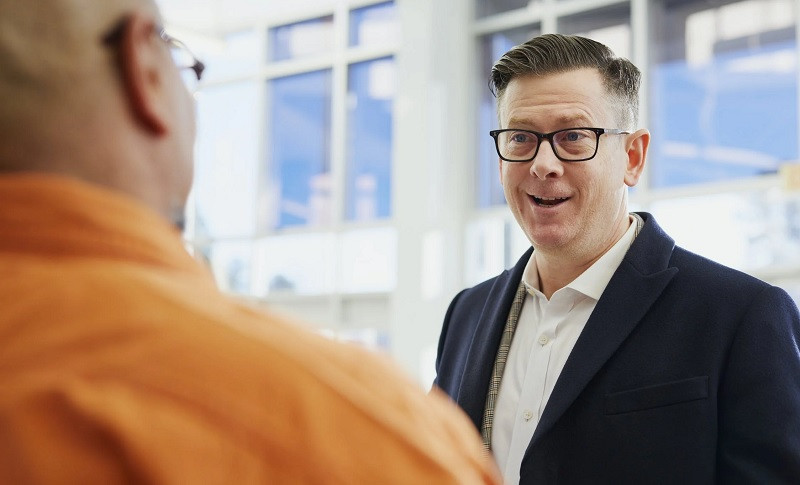Assertiveness is much more than a way of communicating; It allows us to maintain a balanced self-esteem, makes it possible for us to take advantage of the opportunities that arise in our path, and also facilitates the prevention of misunderstandings and conflicts by others (often caused by not saying important things on time).
And knowing how to say no, for example, is a skill with many more psychological implications than it seems at first; And the same goes for daring to take the step of opting for a promotion at work, defending yourself against unfair criticism, or not accepting an unfavorable agreement.
In this article we will review the main key aspects that can be worked on to develop assertiveness both in private life and in the professional field.
What does it mean to apply assertiveness to relationships?
Assertiveness is a fundamental concept both in the world of Social Psychology and, in the applied field, in the world of organizations, business communication and team management. This is the ability to apply strategies used to express important ideas or opinions at the right time. without allowing the fear of making people uncomfortable or generating a relatively intense emotional reaction lead to sending out a confusing, overly “pretty” message or even to not say anything and leave that conversation for another time (falling into procrastination).
On the other hand, in assertiveness there is a healthy balance between defending the interests of oneself or the team or organization to which one belongs, on the one hand, and respect for the interests and way of being of the interlocutor Therefore, being assertive is not simply about communicating something unilaterally, without worrying about how whoever hears or reads what we say will feel; It also means saying it by adapting to their personality, their expectations, or even their cultural background, but without letting that serve as an excuse to deceive ourselves and not communicate what we really should communicate.
Currently, there are many studies that reflect how useful it is to be assertive: it allows you to prevent the appearance of conflicts in time, it helps you progress professionally and defend your own candidacy for a position, it makes it less difficult to get out of toxic relationships, it is a key piece in negotiation skills, etc. Furthermore, luckily, Assertiveness can be trained through learning and that is why in many cases it is one of the skills enhanced in psychotherapy processes, by helping patients face their fears and ensuring that their social environment provides them with support from others, and not added obstacles.
What to do to develop assertiveness?
As we mentioned, assertiveness can be trained in the context of psychotherapy (if the patient’s problem requires it), and in fact, the most effective way to achieve progress in this sense is to go to the psychologist, to benefit. of personalized treatment from professionals who are experts in human behavior. Now, there are some key ideas and strategies that can also be helpful in working on assertiveness for yourself. Let’s see what they are.
1. Know how to control times
If we do not establish temporal references, it is very easy for us not to apply sufficient assertiveness and that we end up postponing important conversations again and again That is why it is key to set deadlines and know what priority to give to each thing we communicate.

2. Quickly recognize self-sabotaging thoughts
The great enemies of assertiveness are self-sabotaging thoughts, ideas that come to our mind when we begin to experience stress or anxiety at the prospect of doing something and that offer us excuses to deceive ourselves and not move from desires to actions
3. Know how to connect with past satisfactory experiences linked to assertiveness
To communicate assertively, it is important to motivate ourselves in that direction, and for this it is very useful keep in mind the memories of situations in which, even though we were afraid to say something, we ended up taking the step and our situation improved considerably.
4. Learn from mistakes
On the other hand, it is also important to know how to detect those situations in which we were not assertive enough and analyze the problematic consequences that this generated, in order to prevent something similar from happening to us again
5. Develop good analysis skills
To communicate assertively, it is essential to be able to break down what we think we should say into smaller parts, in order to select the most relevant elements to which we should give priority and prevent them from going unnoticed when broadcasting our message
6. Show empathy
As we have seen, assertiveness also includes the ability to adapt the message without allowing it to take away important information or give rise to misunderstandings, while respecting the interlocutor and, as far as possible, preventing them from feeling bad. That is why it is crucial to develop empathy; not only for the ethical aspect but also because what the other person interprets of our attitude and our intentions can also modify their interpretation of what we say.
7. Practice self-care
To be assertive people we need to maintain self-care strategies and routines in general. It is difficult to defend our opinions and interests if we abandon ourselves in other aspects of life
8. Know when to seek help
In some cases in which there are many emotions at play and the situation overwhelms us due to its complexity, to develop the necessary degree of assertiveness it may be necessary to go to psychotherapy.
And part of the ability to be assertive involves assume that this is an aptitude that occurs at various levels: it is not a question of having or not having assertiveness Therefore, in some very important cases for us, such as normalizing a family relationship or breaking up a relationship or friendship that has become toxic, it may be most appropriate to have professional support to get out of the loop of self-deception. and the fear of taking the step.
Are you looking for professional psychological assistance services?
If you want to have the support of a team of psychologists with decades of experience, contact us.
In Cepsim Psychological Center We work serving adults, adolescents, families and couples, and we offer face-to-face sessions in our offices located in Madrid and also through online therapy.









